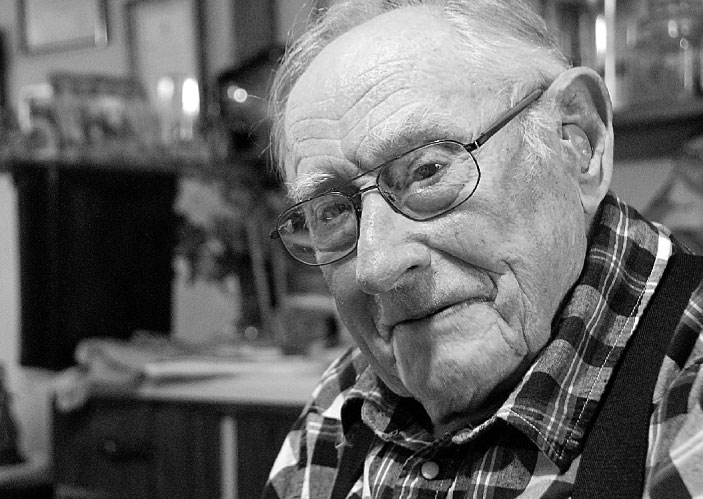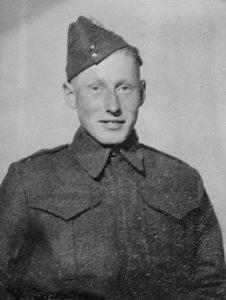County News
On the beach


Charles Russ Burrows was just 18 when he joined the Royal Canadian Engineers. He turned 21 in a German prisoner of war camp.
Russ Burrows offers a firsthand account of landing on Dieppe in 1942 and life as a POW
Those that I fight I do not hate,
Those that I guard I do not love
W.B. Yeats
It was a massacre. There can be no other way to describe what happened that murderous morning. More than half of the 6,086 men who went ashore in the raid on Dieppe in the early hours of August 19, 1942 were either killed,wounded or captured. It was all over by 11 a.m. Nearly 1,000 men lay dead or dying on the beach. Most were Canadians— boys from places like Hillcrest Mines, Alberta and South Milford, Nova Scotia.
The raid was meant as a test of German defences. It was a horrific and devastating failure. Yet the architect of the operation, Lord Louis Mountbatten, would later describe the raid as a “necessary evil” claiming that the lessons learned in Dieppe saved lives in Normandy. Seventy-one years later those words continue to ring hollow for Russ Burrows.
Burrows was among the 5,000 Canadians who went ashore at Dieppe just before 5 a.m.. He witnessed dozens of his friends die that morning.
He was captured at gunpoint. He believed his life was over. He was just 20.
But he wasn’t killed. Instead, he and nearly 2,000 other Allied servicemen were rounded up as prisoners of war. He would spend the next two years and eight months behind barbed wire.
Today Russ Burrows, 92, lives in a small house on Washburn avenue in Picton. He is surrounded by images of family. On one wall is a photo of the young, red-headed recruit—prim, poised and eager for adventure. Nearby is a large photograph of trainees of the Royal Canadian Engineer Corps. His is amid the array shiny faces captured in this photo taken in Petawawa in 1940.
THE PATH TO FRANCE
Burrows was born in Jacksonville, Illinois, but was raised on a farm north of Oshawa. School wasn’t for him. So, soon as he could, he headed north to find work. He toiled as a farm hand and as a bushman. He roamed aimlessly from Kapuskasing to western Ontario. He wasn’t yet 18 when war broke out. Undaunted, he tried to sign up in Thamesville near London.
But lacking a specific trade, Burrows was rejected. He tried two more times that winter to enlist—but each time was turned away. In February he had learned the Royal Canadian Engineers were looking for recruits.
“You look like a lumberjack,” said the recruiting officer. “We need bushmen.”
“That’s what I am,” said Burrows proudly.
Looking back, Burrows notes that the only trees he ever cut down during his military service were while training in Petawawa. Later that year he boarded a train for Halifax. There he waited with thousands of other young men on Pier 21— preparing to ship overseas. Burrows sailed that fall aboard the Georgic, a luxury cruise ship converted to a troopship, landing in the Port of Clyde in Scotland. He was sent to Pangbourne on the Thames near Reading. He learned to build pontoon bridges and hospitals.
“London was being bombed every day, every day,” observed Burrows wistfully. “There was a lot of building needed.”
He also built dozens of tank traps, wooden chair-shaped devices designed to overturn a tank that attempted to roll over the contraptions. He built concrete gun ports along the English coast that were fitted with wooden guns, meant to persuade the enemy they were real.
The following spring Burrows was moved to the Isle of Wight with thousands of other Canadian troops. They were told they were preparing for an invasion into France set for July 4, 1942. It would be a test run. The idea was to get in, cause some havoc, destroy some facilities and then get out.
But as the target date approached, the weather turned bad and the operation was scrubbed. A new date of August 19 was chosen. But the advance bombers and paratroopers were dropped from the plan.
As the Canadians landed on the beach they were shelled from the cliffs above. Months of training evaporated, and confusion reigned. In such a perilous position some never made it to shore—dying before they could get off their ships.
Burrows and his company of Royal Canadian Engineers were tasked with clearing a path for Allied tanks. But the futility of the raid was almost immediately apparent.
“We knew we were in trouble as soon as we landed.” recalls Burrows. “Daylight was soon upon us and we were pinned down on the beach.”
He was captured, along with about 2,000 others— amid the carnage of hundreds of fellow Canadians on the beach. It was not clear at all, that the prisoners would live out the day.
“I was pretty scared,” admits Burrows.
It was worse for his family. They received a telegram reporting that Burrows was missing in action. That was followed by another that said he had died on the beach at Dieppe. But just a few days later, another letter, this one written by Burrows himself explaining his plight, arrived. The local postman ran it straight to the Burrows home to his much relieved family.
Burrows was transported to Stalag 8 near Lamsdorf Germany, now within the borders of Poland. The first few months in the POW camp were tolerable according to Burrows. They received fresh water and food. Occassionally a Red Cross parcel would arrive with jam, tinned meat called Bully Beef and other treats.
“I didn’t hate them,” said Burrows of his guards. “They had jobs to do.”
He celebrated his 21st birthday with a candle in a piece of black bread. Life fell into a predictable, if somewhat tedious, pattern. That is until it became clear the Germans were losing the war. By the end of 1944 the Germans were in retreat on two fronts.
That winter the prisoners were forced to march westward during blizzards and bitter cold, and deprived of food. In the atrocious conditions many succumbed to illness and cold. The prisoners were forced to survive on whatever they could scrounge along the roadway.
He, along with an Albertan named Pat Ireland and an Englishman he remembers only as Sussex— the young man’s home county—escaped along a logging road. They ran into the nearby treeline and lay down in the snow and branches until the marchers and their guards had passed.
At a nearby farmhouse the threesome came across a woman pumping water from a well.
“She just about jumped into the well when she saw us,” recalled Burrows.
She ushered them into the house where she fed them potato pancakes.
“They tasted like the sweetest cake,” said Burrows.
She explained in broken English that she had lost a son to the war and that her husband and two remaining sons were still on the front.
The threesome headed for the port city of Lubeck near Hamburg. As they got nearer, they joined another column of prisoners. By now their guards had either disappeared or were simply going through the motions.
“They knew the war was over,” said Burrows. The decision to join the group soon paid off. The next day a Red Cross parcel arrived for each of the prisoners.
“We never went hungry after that,” said Burrows.
By the end of April they met up with British troops. Burrows and his fellow prisoners were ordered to seize the weapons from their remaining guards. Switching roles, the prisoners became guards.
“For many of them, including many of the German people, it was a relief,” said Burrows.
Soon after Burrows, Ireland and Sussex found a car and headed toward Bremerhaven. But passage across the Elbe River was clogged. They met a British unit that promised to return them to England.
“That morning I had my first shower and shave since February,” said Burrows.
By then a bushy red beard had accumulated on his young face. True to their word, Burrows and his three buddies were in England about 24 hours later.
That is where he was on VE day.
“The war was over,” said Burrows.
He kicked around a while after returning to Canada. He found it difficult to settle back into life at home. He turned down a job picking tomatoes, but soon got a construction labouring job building sewer forms in Oshawa. Eventually he got on at the General Motors and spent most of his career on the line. He raised six kids, most live close by.
He raised six kids, most live close by.
Last year, he and six other veterans travelled back to Dieppe for ceremonies commemorating the disastrous raid and the terrible cost in Canadian lives.
Burrows is gracious with his time and patient in the retelling of his story. Yet he remains guarded about the price he has paid and the scars that won’t heal. His eyes become red and swollen. He struggles to find words.
“I lost a lot of good buddies that day,” said Burrows. “Unless you were there, you can never understand what it was like.”


Have heard bits and pieces of this story but never the whole thing. We are blessed to have him in our lives, Russ is an awesome man.
thank you for telling my grandfather’s story. Until today i never knew what really happened. It was always too painful for him to tell the grand kids. Thank you again!!